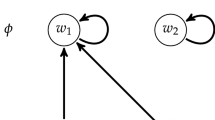Abstract
The semantics Vann McGee gives for his 1989 conditional logic is based on Stalnaker’s 1968 semantics but replaces the familiar concept of truth at a world with the novel concept of truth under a hypothesis. Developed here is a semantics of the standard type, in which sentences are true at worlds, only with additional constraints imposed on the accessibility relation and the selection function. McGee conditionals of the form A ⇒ X are translated into Stalnaker conditionals of the form \( \Box \)A > X. An interpretation of the semantics is provided, and a few implications for the theory of indicative conditionals and their probabilities are noted.
Similar content being viewed by others
Notes
There is one complication, which here can only be acknowledged, not dealt with: the construction in Sect. 3.2 assumes the set of McGee worlds to be finite. When it is infinite, the construction of the selection function for Stalnaker+ models breaks down.
Incidentally but relatedly: the one-fell-swoop replacement of every ⇒ with a combination of \( \Box \) and > proposed here is quite different from McGee’s recursive McGee-to-Stalnaker translation scheme (1985, pp. 469–470).
Cantwell (2016) first drew my attention to the failure of Import–Export for left-nested constructions.
The scenario actually suggests a Stalnaker+ model with three terminal states, corresponding to no rain, light rain, and heavy rain, respectively, and four non-terminal states. This seven-state model is less trivial than the three-state model described earlier.
The non-equivalence of (p ∨ (p ⇒ q)) ⇒ (p ⇒ q) and ((p ∨ (p ⇒ q)) ∧ p) ⇒ q also runs counter to the principle Mandelkern (2018b) calls Restricted Import–Export. On the other hand, the present semantics supports the principle Mandelkern calls Nothing Added, which he criticizes McGee’s (1985) system for not validating.
References
Adams, E. W. (1998). A primer of probability logic. Stanford, CA: CSLI Publications.
Cantwell, J. (2016). The logic of the indicative conditional. (Manuscript).
Lance, M. (1991). Probabilistic dependence among conditionals. Philosophical Review, 100, 269–276.
Lewis, D. K. (1976). Probabilities of conditionals and conditional probabilities. Philosophical Review, 85, 297–315.
Mandelkern, M. (2018a). The case of the missing ‘if’: Accessibility relations in Stalnaker’s theory of conditionals. Semantics and Pragmatics. https://doi.org/10.3765/sp.11.8.
Mandelkern, M. (2018b). Import-export and ‘and’. Philosophy and Phenomenological Research. https://doi.org/10.1111/phpr.12513.
McGee, V. (1985). A counterexample to modus ponens. Journal of Philosophy, 82, 462–471.
McGee, V. (1989). Conditional probabilities and compounds of conditionals. Philosophical Review, 98, 485–541.
Stalnaker, R. C. (1968). A theory of conditionals. In N. Rescher (Ed.), Studies in logical theory (pp. 98–112). Oxford: Blackwell.
Stalnaker, R. C. (1981). A defense of conditional excluded middle. In W. L. Harper, R. Stalnaker, & G. Pearce (Eds.), Ifs (pp. 87–104). Dordrecht: D. Reidel.
Stalnaker, R. C., & Thomason, R. H. (1970). A semantic analysis of conditional logic. Theoria, 36, 23–42.
van Fraassen, B. C. (1966). Singular terms, truth-value gaps, and free logic. Journal of Philosophy, 63, 481–495.
Acknowledgements
I am grateful to Vann McGee, J. Karel Lambert, Hannes Leitgeb, John Cantwell, Wolfgang Spohn, Branden Fitelson, Jeffrey Barrett and especially Peter Woodruff for helpful exchanges, and to two Erkenntnis referees for detailed comments that led to significant revisions, especially in the last section.
Author information
Authors and Affiliations
Corresponding author
Rights and permissions
About this article
Cite this article
Norlin, K. A Stalnaker Semantics for McGee Conditionals. Erkenn 86, 59–70 (2021). https://doi.org/10.1007/s10670-018-0093-6
Received:
Accepted:
Published:
Issue Date:
DOI: https://doi.org/10.1007/s10670-018-0093-6



